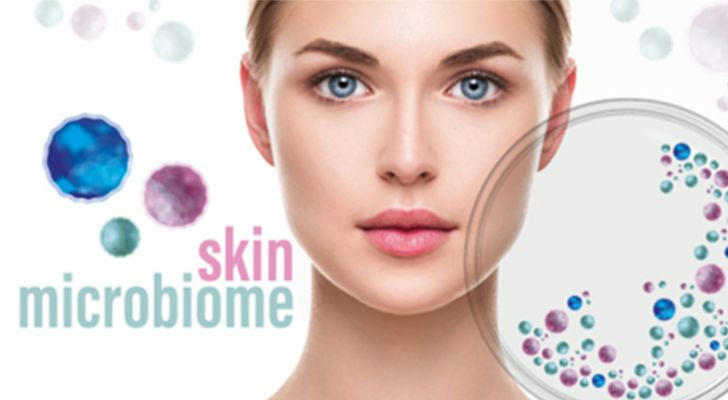Unveiling the Secrets of the Skin Microbiome: How to Promote a Healthy Microbiome and Achieve Glowing Skin✨
Your skin is home to a complex ecosystem of microorganisms, including bacteria, fungi, and viruses, collectively known as the skin microbiome. This invisible world plays a critical role in maintaining your skin's health and appearance. A balanced microbiome is key to vibrant, glowing skin, but how can you promote it and keep your skin looking its best? Here are some practical steps to support a healthy skin microbiome and achieve radiant skin, supported by research and data.

1. Use Gentle, Non-Stripping Skincare Products
🧴 Avoid Harsh Cleansers!
Harsh cleansers can disrupt the balance of your skin's microbiome. A 2017 study showed that cleansing products with strong detergents could lower beneficial bacteria on the skin, leading to an imbalance that might cause dryness and irritation. Opt for products that maintain the skin’s natural oils and preserve its protective barrier.
Tip: Choose sulfate-free and pH-balanced cleansers. Products with probiotics or prebiotics can help nourish good bacteria and maintain a healthy microbiome.
2. Avoid Over-Cleansing Your Skin
🚫 Less Is More!
While cleansing is important, overdoing it can strip the skin of its natural defenses. Over-cleansing has been shown to reduce microbial diversity, making the skin more vulnerable to irritation. A simpler routine—washing your face no more than twice a day—helps protect the skin’s natural balance.
Tip: Limit face washing to twice a day to avoid disrupting the skin microbiome and causing potential issues like dryness or inflammation.
3. Incorporate Probiotics into Your Diet and Skincare
🍽️ Good Bacteria for Good Skin!
Probiotics are beneficial bacteria that can improve skin health by promoting a balanced microbiome. A 2020 study found that probiotics might help reduce acne and eczema by supporting the skin's immune system. Incorporating probiotic-rich foods like yogurt, kefir, or kimchi into your diet can have a positive impact on your skin.
Tip: Add fermented foods to your meals and look for skincare products with probiotic ingredients to help nurture your skin’s microbiome.
4. Protect Your Skin from Environmental Stressors

🌞 Shield from Pollution and UV Rays!
Environmental factors such as pollution and UV rays can damage the skin’s microbiome. A study published in The American Journal of Clinical Dermatology found that exposure to pollution increases harmful bacteria on the skin, leading to inflammation and premature aging.
Tip: Use sunscreen every day to shield your skin from harmful UV rays and consider using antioxidants in your skincare routine to fight the effects of pollution.
5. Choose Skin Care Products with Prebiotics
💡 Feed the Good Bacteria!
Prebiotics are ingredients that feed and support beneficial bacteria on the skin. A 2018 review in Nature Reviews Microbiology highlighted how prebiotics help improve skin health by maintaining the balance of the microbiome. Prebiotic skincare products can promote healthy bacteria growth and help restore balance to your skin.
Tip: Look for skincare products containing prebiotic ingredients like inulin or fructooligosaccharides, which nourish good bacteria and help reduce inflammation.
6. Keep Stress Levels Under Control
😌 Stress Less, Glow More!
Stress negatively affects the skin microbiome, increasing inflammation and making skin more prone to conditions like acne or eczema. Studies show that stress can alter the microbial balance, making the skin more vulnerable to infections.
Tip: Engage in stress-reducing activities such as meditation or yoga, and prioritize sleep to help keep your skin’s microbiome in check.
7. Avoid Excessive Use of Antibiotics
💊 Be Mindful with Antibiotics!
Antibiotics can disrupt both harmful and beneficial bacteria, leading to imbalances in the skin microbiome. Studies have found that overusing antibiotics can make the skin more prone to bacterial overgrowth and irritation.
Tip: Use antibiotics only when prescribed by a healthcare professional and avoid overusing products with harsh antibacterial agents that can damage your skin’s natural ecosystem.
8. Maintain a Healthy, Balanced Diet

🥗 Feed Your Skin with Nutrients!
What you eat can impact your skin microbiome. A diet rich in antioxidants and healthy fats can help reduce inflammation and support a balanced microbiome. Research suggests that foods like berries, leafy greens, and fatty fish can promote overall skin health by supporting the growth of beneficial microorganisms.
Tip: Include nutrient-dense foods like fatty fish, leafy greens, and nuts in your diet to promote a healthy skin microbiome and reduce inflammation.
9. Hydrate Your Skin and Body
💧 Hydration is Key!
Keeping your skin hydrated is essential for maintaining a balanced microbiome. A study in Dermatology and Therapy found that dry skin leads to a reduction in microbial diversity, which can increase sensitivity and make the skin more prone to irritation.
Tip: Drink plenty of water throughout the day to hydrate from the inside, and use moisturizers with hydrating ingredients like hyaluronic acid to lock in moisture.
10. Give Your Skin Time to Adjust
⏳ Patience Pays Off!
When introducing new skincare products, it’s important to give your skin time to adjust. Rapid changes can overwhelm the skin's microbiome, leading to irritation or breakouts. Studies suggest that gradual changes to your skincare routine allow the skin to adapt without causing disruption.
Tip: Introduce new products one at a time and give your skin at least a few weeks to adjust before adding more changes to your routine.
Final Thoughts
Achieving glowing, healthy skin isn’t just about using the right products—it’s about supporting the delicate balance of your skin’s microbiome. By following these steps and incorporating these scientifically-backed tips, you can nurture your skin’s natural ecosystem, promote the growth of beneficial bacteria, and keep harmful microbes at bay. With the right approach, your skin can look and feel its best, radiating health from the inside out. 🌟
